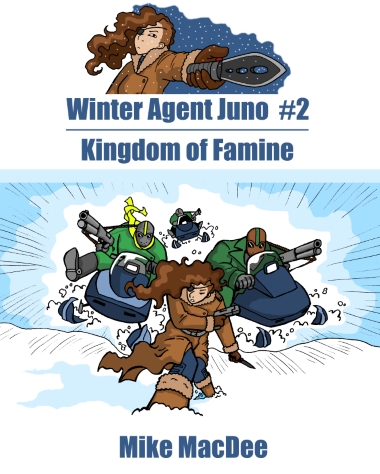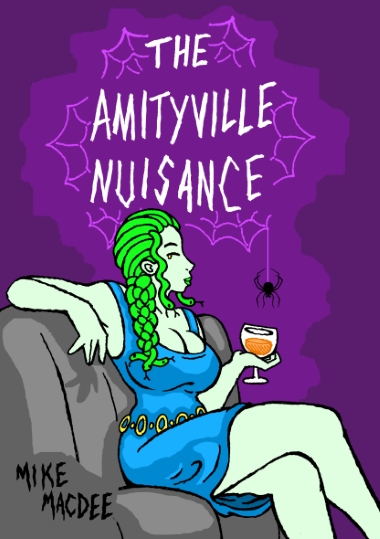And sometimes you write a good villain and aren’t sure how to send her off. Good bad guys need to have equally good sendoffs or it’s anticlimactic. I lost track of how many times I rewrote the ending.
Mike MacDee – 31 August 2017
The Back Flap
Juno faces her most dreaded adversary: HER RELATIVES.
When Juno gets word of her estranged mother’s suicide, she returns to her dystopian home town to bury the hatchet along with her. The moment she gets off the train, the past assaults her with embittered sisters, childhood crushes, obnoxious dogs, and a very smitten gang leader with ultraviolent tendencies.
Trouble is, the more Juno wonders about her mother’s death, the more everyone urges her to get out of town. And the more they urge her to leave, the stronger her own urge gets — the urge to gut the city’s corrupt underbelly.
About the book
What is the book about?
Kingdom of Famine is set during nuclear winter on an alternate earth, and is the second installment in the Winter Agent Juno dystopian adventure series. An ex-military woman finds out her estranged mother just committed suicide under dubious conditions, and decides to go back to her home town to sort out the matter. Fist fights and shootouts ensue.
When did you start writing the book?
Sometime last year, probably. Although most of my books are stitched together from several lesser, unfinished books, so maybe longer.
How long did it take you to write it?
One year and too many cigars.
Where did you get the idea from?
After I wrote the first book in the series, The Helios Legacy, I started wondering what kind of family Juno came from. I mean, this gal can crush a person’s windpipe with her hands and makes deadly weapons out of household items. She’s probably killed a couple hundred people in her lifetime. If that’s the life she chose, what sort of life did she run away from? Then I started thinking how much fun it would be to have this hardened army vet shrug off bullets and mortal danger, but dread family reunions. It seemed like a lot of potential for laughs.
Were there any parts of the book where you struggled?
I usually struggle from beginning to end. It’s the plot that’s always a pain to keep on track so the story doesn’t go on tangents or get boring.
And sometimes you write a good villain and aren’t sure how to send her off. Good bad guys need to have equally good sendoffs or it’s anticlimactic. I lost track of how many times I rewrote the ending.
What came easily?
The characters are rarely a problem: they tend to write themselves. Writing a villain faction that’s essentially an organized gang, though…that proved to be a handful. You can’t populate a gang with a bunch of faceless red-shirts, ‘cos they’re not faceless — they’re all criminals with rap sheets and street cred and nicknames. And each time I wrote a firefight and killed off a handful of them, I had to take inventory of who was left. Sometimes I’d start running out of gang members, invent new ones to pad their ranks, and end up giving the new character more scenes so they wouldn’t come out of nowhere. Most of the time it worked out and made the cast feel more alive. Jezebel the Jackal didn’t exist until late in the novel’s development; she ended up becoming a major player by the end.
Are your characters entirely fictitious or have you borrowed from real world people you know?
A little of both. Sometimes I have a character in mind and know a real-life person I can use as a model. Juno’s mother was based on a certain self-indulgent “feminist” author, whose children didn’t hold their neglectful mom in very high regard. It was a perfect springboard.
We all know how important it is for writers to read. Are there any particular authors that have influenced how you write and, if so, how have they influenced you?
Of course. I’m a fan of Elmore Leonard, Richard Stark, and the greats of hardboiled fiction. Hammett influenced me a great deal because he never embellished his settings: he wouldn’t spend a page and a half describing a blade of grass or what the hero had for breakfast. He was concise and to-the-point. I try to do the same because too much description or exposition bores me. I also really dig the SOBs series by Jack Hild, which influenced the structure of the Winter Agent Juno books. More on that later.
Do you have a target reader?
If I do, I never figured it out. Everything I write is weird and niche. My target reader is probably boys and girls who like video games.
About Writing
Do you have a writing process? If so can you please describe it?
Lots and lots of vodka.
Okay, okay, it’s sorta like ramen noodles. I let a story simmer and boil for awhile, keep adding stuff periodically, until eventually it’s ready to eat. Or ruined. Whichever comes first.
Do you outline? If so, do you do so extensively or just chapter headings and a couple of sentences?
I usually write a synopsis so I know the characters and sequence of events. I hate staring at a blank page and not knowing what to write. But I don’t like outlining in too much detail because I know a lot of it will change by the end, so there’s no sense setting so many things in stone early on. My initial outline had the book end in Juno’s mother’s house, duking it out with the villain in a flooded basement while the upstairs was in flames. It’s a cool visual, but hard to justify plot-wise, so it didn’t end up happening in the final version. I let the story take its natural course instead of trying to railroad it, and it worked out much better.
Do you edit as you go or wait until you’ve finished?
As I go. Lately I’ve been trying not to edit so much ‘til it’s done, but I’m a creature of habit, and sometimes taking your time with a project can help just as much as getting it over with and editing later. I ran a webcomic called Daddy’s Girl on Smackjeeves for three years that I’d wanted to finish in one, but if I had, the story and art wouldn’t have been nearly as good.
Did you hire a professional editor?
I did for a couple of projects, mostly because anyone else I asked for critiques, I never heard from again. I figured a professional would be obligated to read and respond. Lately I’ve just been paying someone for ebook formatting. I don’t have enough of an audience to invest the extra money in editors. I invest too much in giveaway copies as it is.
Do you listen to music while you write? If yes, what gets the fingers tapping?
I listen while I edit. If I listen while I write, it can limit the outcome of my writing process. Once I have the stuff written out, I find a soundtrack that suits the mood and just play it on infinite loop ‘til I’m done polishing everything.
Sometimes I’ll put on a theme tune before I sit down and start writing, to get pumped up. Whenever I worked on a “Mata the Fox” story I’d play the Mission: Impossible theme before diving in, because both properties are espionage fiction. That and Lalo Schifrin is the man.
With Kingdom of Famine, I listened to a lot of Tangerine Dream film soundtracks. And Sam Kuzel’s score for Angel of the City, a terrible short film with an awesome 80s style soundtrack.
About Publishing
Did you submit your work to Agents?
I have never submitted to an agent, but I’ve been considering it recently. I don’t think they’d go for a book series that I couldn’t sell very well on my own, though.
What made you decide to go Indie, whether self-publishing or with an indie publisher? Was it a particular event or a gradual process?
I tried getting published in lit magazines for years, to no avail. Shadow of the Fox got snatched up by Pro Se Press, so that was my first publication. Everything else I’ve self-published, mainly because I don’t have to wait several years for each book to come out, or worry about whether my work fits a publication schedule. It’s ready when I say it’s ready…for better or worse.
Did you get your book cover professionally done or did you do it yourself?
I do my own book covers. I don’t recommend all authors do it themselves, because most authors don’t understand art composition. I do comics as well, so I can at least make something presentable and unique-looking as a way of signing my work.
“Unique” being the keyword. I’ve never been too impressed with pro book cover designer portfolios. All their covers are either super bland and identical to everyone else’s, or look like something I could do myself in MS Paint in under an hour. Whether or not my artwork is any good, it stands out from everyone else’s generic thumbnails, and that’s probably more important.
For the Winter Agent Juno book covers, I took several cues from men’s adventure fiction of the 70s and 80s: protagonist portrait, series title, novel title, and a “still frame” of a scene from the book itself. I structured the back cover hooks and the first few pages after the SOBs series by Jack Hild. It all helps to make the books feel just a little more pro, even though they’re totally amateur hour.
Do you have a marketing plan for the book or are you just winging it?
Winging it. I’ve been promoting the Winter Agent Juno series with video games: google the “Project Einherjar” Doom mod if you’re into old school first person shooters.
Any advice that you would like to give to other newbies considering becoming Indie authors?
Don’t quit your day job. You can count on one hand the total number of authors who make a living off their writing. The rest of us have to settle for “hobby” status. So do it ‘cos you can’t help it.
About You
Where did you grow up?
I grew up in Glendale, AZ, where the weather is always either scalding you to death or drowning you. I’m basically still there, trying to find a way to escape. Maybe to Oregon or Missouri.
What would you like readers to know about you?
I like kaiju films. I’m not bad at impressions, mostly of old actors and cartoon characters. I’m a big fan of jazz in general. I enjoy fine cigars (Cubans aren’t the only good ones, folks). I’m also 5’9”, single, and enjoy long walks on the beach (even in a land-locked desert state).
What are you working on now?
Winter Agent Juno #3: Last of the Ghost Lions. It should be a lot more action-oriented than the previous two books. By the time this goes online, I’ll probably also have published The Amityville Nuisance, a supernatural romantic comedy adventure, about a modern wizard and a feisty medusa investigating the Amityville house and also their failed relationship. And I’m still updating Daddy’s Girl on tapas.io, in its second run. It’s a martial arts comic that updates daily.
I might also try fostering some puppies. Who knows?
End of Interview:
For more from Mike, visit his website, follow him on Twitter, or check him out on Youtube.
Get your copy of Kingdom of Famine from Amazon US or Amazon UK.



